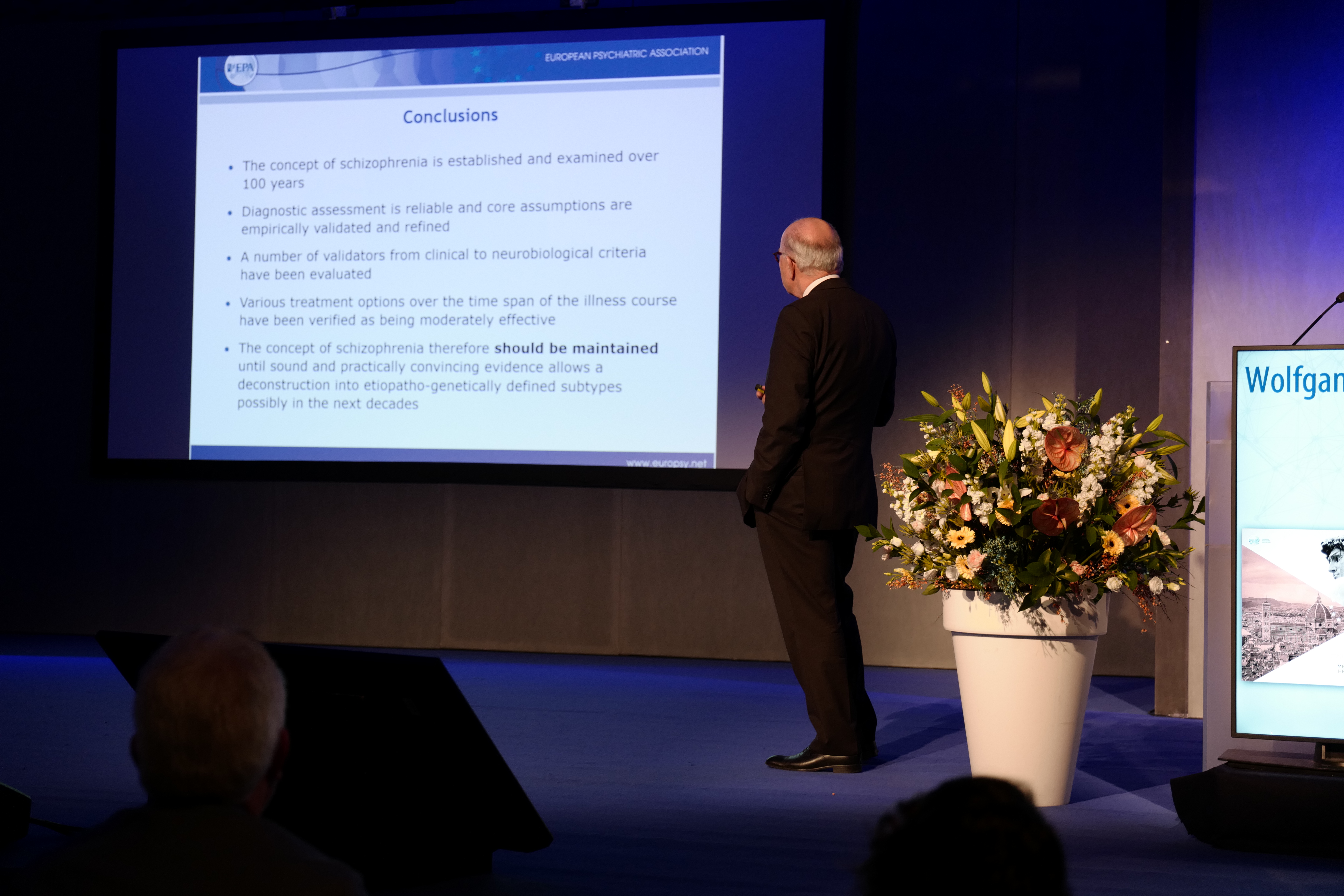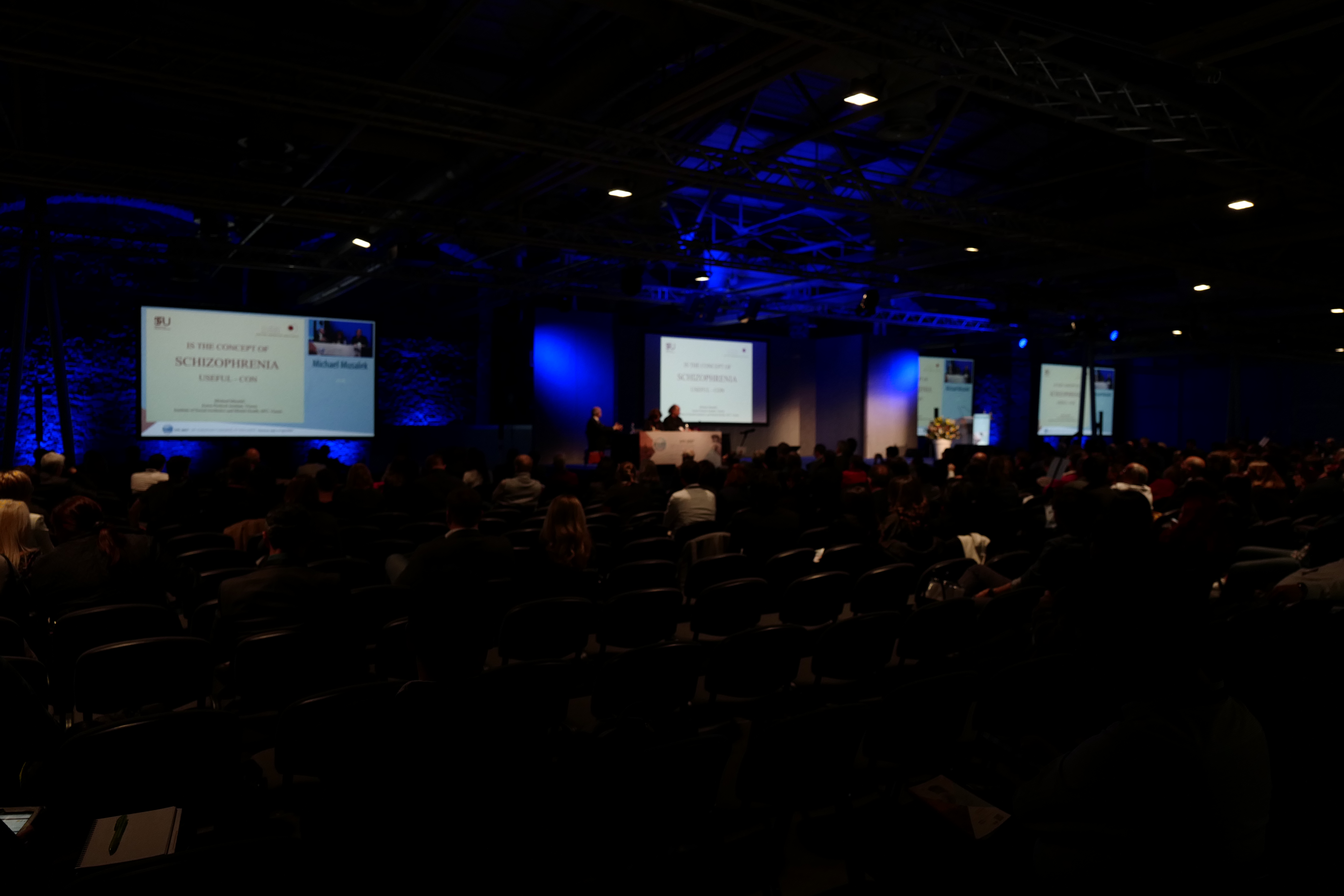


In un dibattito sulla questione se il concetto di schizofrenia è ancora utile, entrambi i relatori - pro e contro - hanno presentato casi importanti. Alla fine il pubblico era ancora diviso, la riprova del fatto che le letture hanno dato molto da pensare.
Prof Wolfgang Gaebel, Heinrich-Heine University, Germany, opened the debate with a brief history of the concept of schizophrenia. ‘Dementia praecox’ was first described in 1893. It defined mental disease entities based on an overall clinical picture of symptoms, course and outcome. The group of disorders sharing a set of clinical features (with different etiology) was termed ‘the schizophrenias’ in 1911. The name was derived from the Greek ‘schizen’ (splitting) and ‘phren’ (soul, spirit, mind). While the concept of schizophrenia has undergone many changes since its first inception, it has stood the test of time. Prof Gaebel argued that it provides useful information on the clinical picture and course, as well as treatment options.
The name was derived from the Greek ‘schizen’ (splitting) and ‘phren’ (soul, spirit, mind).
Schizophrenia describes a clinical syndrome, not a disease entity. A syndrome consists of co-emerging specific symptoms of unknown etiology and has no clear boundaries with other entities. The current conceptualization of schizophrenia is that it is a serious mental illness characterized by a mixture of positive, negative, disorganizational, cognitive, psychomotor and mood symptoms. Different neurobiological, psychological and social-environmental factors play a role in illness development and course. But the exact etiopathogenesis is unclear.
Prof Gaebel pointed to the high diagnostic reliability of schizophrenia - both inter-rater and test-retest reliability. He also noted the construct validity of the symptom dimensions. In a systematic review, the majority of the 39 studies included reported all of the dimensions of positive and negative symptoms, disorganization, and affective symptoms. Clinical validity (symptom onset) and longitudinal validity (types of illness course) were also presented.
The concept of schizophrenia has been useful to establish evidence-based guidelines for diagnosis and treatment, and to provide valuable information on psychosocial outcomes.
The concept of schizophrenia is established, and has been examined for over 100 years.
The etiopathogenesis of schizophrenia is complex and unclear. Many biological processes seem to be involved. Prof Gaebel posed the amusing question of whether these processes could be considered as one large elephant, or rather as many animals.
He pointed to recent genetic and neurophysiological studies that identify common ground of etiopathogenesis. Schizophrenia may be a mental disorder with genetic influences and a common pathway in disturbances of brain circuits due to altered neurotransmission.
Reliability, which means agreement, does not necessarily mean validity.
Prof Gaebel concluded by reminding us that the concept of schizophrenia is established, and has been examined for over 100 years. The diagnostic assessment is reliable and core assumptions are empirically validated and refined. He put forward that the concept of schizophrenia should be maintained until evidence allows for a deconstruction into etiopatho-genetically defined subtypes. Until then, he maintains that the concept is useful and should be kept..
There is … a problem …that affects the validity of nosological categories. This cannot be solved by worshipping at the alter of reliability and operational definitions. What is required is a radical re-thinking of descriptive psychopathology, its epistemological role, and strengths and limits.
G. E. Berrios 1992
Prof Michael Musalek, Anton Proksch Institute, Vienna, presented the opposing argument in this debate. He put forward that while the diagnosis is reliable - in that a patient would be diagnosed with schizophrenia by multiple psychiatrists - it is not valid. Reliability, which means agreement, does not necessarily mean validity.
Prof Musalek presented the key tasks of diagnostics. He answered the question: why do we diagnose? Primarily, it is to inform treatment choices and give information on a patient’s prognosis. It allows for communication with the patient, and an understanding of the pathogenesis of the disease. Other reasons include economy, reassurance for the patient and doctor, politics and gratification. Prof Musalek argued that the concept of schizophrenia does not meet the key reasons for diagnosis - that of treatment, prognosis, communication or pathogenesis.
There are many historical diagnostic criteria for schizophrenic psychoses. The two that stand out are ICD and DSM. Prof Musalek proposed that sticking to established terms and methodologies may be an obstacle in schizophrenia research. The aim of the currently used operational diagnostic approaches was to improve diagnostic reliability. This aim has been achieved. But there has not been remarkable progress in research. More homogenous clinical syndromes need to be investigated with scientifically-based methodologies and technologies. In order to achieve this, Prof Musalek maintains that we need to go back to clinical and empirical realities and to integrate them into the development of a new generation of classification systems - ones that are free of ‘dogmatic thinking’.
Our correspondent’s highlights from the symposium are meant as a fair representation of the scientific content presented. The views and opinions expressed on this page do not necessarily reflect those of Lundbeck.